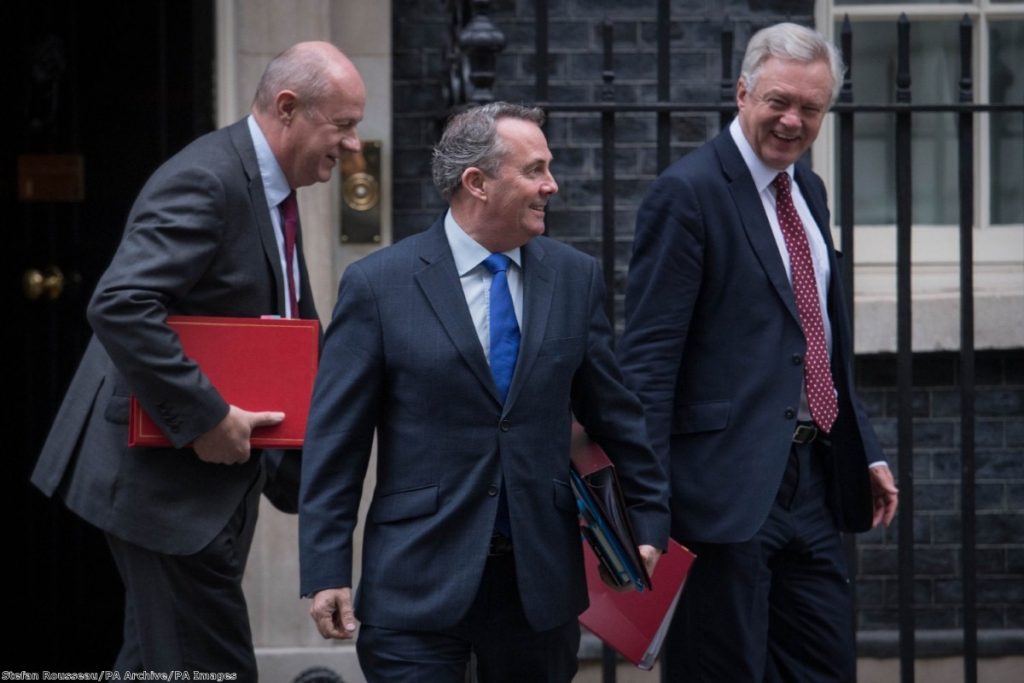By Jolyon Maugham
Last week the Good Law Project, which I founded, published a letter to David Davis' department. That letter made the legal case for the government to publish a series of Brexit studies it commissioned into the effects of Brexit on over 50 sectors of the economy. And we promised to take the government to court if it refused.
Before he became secretary of state for Exiting the European Union, David Davis was a great advocate for publication. Government, he said, "should not be allowed to take away one of the few defences the public has for discovering and preventing incompetence, corruption and misconduct amongst the most powerful people in the land".
But since then? Not so much. A number of people have made Freedom of Information Act requests of his Department for those secret Brexit studies. All have failed. A typical response is published here.


The failure to publish this material is a threat to the proper functioning of government.
As Lord Mance said in the Supreme Court:
"Information is the key to sound decision-making, to accountability and development; it underpins democracy and assists in combatting poverty, oppression, corruption, prejudice and inefficiency. Administrators, judges, arbitrators, and persons conducting inquiries and investigations depend upon it; likewise the press, NGOs and individuals concerned to report on issues of public interest. Unwillingness to disclose information may arise through habits of secrecy or reasons of self-protection."
(You can read his words in a Supreme Court decision, in a case called Kennedy, published here. He went on to recognise that some information can be genuinely sensitive.)
There is no better proof of that first phrase – "information is the key to sound decision-making" – than last year's referendum campaign. Vote Leave, quite deliberately, chose to publish nothing about what Brexit would look like. And there was good reason for this: as Dominic Cummings put it:
"Creating an exit plan that makes sense and which all reasonable people could unite around seems an almost insuperable task. Eurosceptic groups have been divided for years about many of the basic policy and political questions."
Think about that.
There was no plan around which a coalition might unite. Putting one together would fragment the vote. So Vote Leave deliberately chose to let people believe different things. Instead of publishing, it deliberately chose opacity.
And so we find ourselves, some sixteen months on, still not knowing what Brexit means. This, in good part, is why we're unable to move beyond meaningless slogans like 'Brexit means Brexit, 'no deal is better than a bad deal' and 'a deep and special partnership'. We still do not know what we voted for. And we still do not know what we are going to get.

This isn't happening by chance. It's happening because it is in the interests of those pursuing a political project. Ideologues on the hard left and hard right are playing a hideous game of bait-and-switch with working people. They are playing with the sentiments of those who have been screwed over countless times by various governments – governments of both left and right, governments which were sometimes malign and sometimes merely indifferent.
Instead of facing up to the complexities of a globalised world, instead of tackling the consequences of the financial crisis, these ideologues have taken the easy option and blamed a complacent EU.
They've taken the understandable anger of people who were ignored for too long and weaponised it. They have done this in the service of a project that every independent international forecaster without exception thinks will hurt the people they claim to represent. And we now risk enormous damage to the lives of millions to serve the convenience of ideologues.
Imagine the damage which will be done to our democracy when the 89% of Leave voters who did not think that Brexit would make them worse off discover the bitter truth.
In the face of this horror show, there's only one thing which will heal our democracy: an end to the dishonesty, embedded in the policy positions of both Labour and the Conservatives, about what Brexit will mean. And there’s only one way that that can happen: publication of the evidence.
We must not repeat the mistakes of the referendum campaign, when absence of information was exploited by both sides to pursue ideological ends. For our democracy to begin to function again, we must know what Brexit entails. The people must know, businesses must know, trade unions must know and our sovereign parliament must know.
Information is the lifeblood of our democracy. The government must publish. Or we will be damned.
Jo Maugham QC is the director and founder of the Good Law Project. He is a former adviser to the Labour party on tax and a leading member of the Bar of England and Wales.
The opinions in politics.co.uk's Comment and Analysis section are those of the author and are no reflection of the views of the website or its owners









